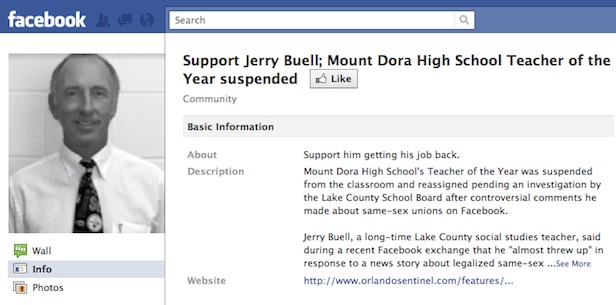Social media is a minefield when it comes to employers and employees. One must navigate carefully, as it is quite easy to get into major trouble – even on the basis of just a few Facebook comments.
Florida teacher Jerry Buell stepped on a mine last month when he made some anti-gay comments on his Facebook page. He has been suspended from the classroom and reassigned pending investigation by the school board, according to the Orlando Sentinel.
He was once voted “Teacher of the Year.”
In a post on July 25th about the recent legalization of same-sex marriage in New York, Buell said that he “almost threw up” when he heard the news.
In that same post, he elaborated on his feelings about same-sex marriage, calling them “a sin” and making reference the the practice as a “cesspool.” I can’t imagine what he would have had to say about the possible Bert & Ernie marriage on Sesame Street.
Buell contended that he was within his rights to say what he wanted to say on his own time, from his own personal computer. “It wasn’t out of hatred,” he said. “It was about the way I interpret things.”
Here’s that problem with Buell’s defense: it doesn’t fly in many states, especially Florida. The Lake County School District has already come up with social media guidelines that discuss what teachers can and cannot post on their private Facebook pages.
The guidelines, among other things, warn teachers that they should “delay posting until you are calm and clearheaded. If you feel angry of passionate about the subject, it may not be the time to share your thoughts in a post.”
A Facebook page has already been created in support of Buell, entitled “Support Jerry Buell; Mount Dora High School Teacher of the Year Suspended.” Although the page only has a handful of likes, there is plenty of chatter on its wall about the situation.

Should employers have the right to fire employees based solely on comments posted to social media sites like Facebook and Twitter? Of course, it’s probably not a great idea to call your boss a dick on Facebook (especially if you’re friends with them), but if he fires you for it, do you have a complaint?
The National Labor Relations Board has taken up numerous cases of wrongful termination based on Facebook posts. One recent example involved a woman fired from an ambulance company for called her boss a scumbag on Facebook. She won a settlement before it could go to trial.
Or course, teachers are held to a higher standard by most – since they work with children. And with many school boards adopting social media policies, teachers might have to learn to keep their mouths shut.
Imagine the type of impact comments like this would have on the classroom environment if students were to catch wind of them. Sure, some Buell supporters would claim that he has a free speech right to express his opinions via social media – but since those comments could affect his ability to properly execute his job, should he be allowed to make them?
That question is most likely one of the reasons a new Missouri law is trying to ban teachers and students from being friends on Facebook.
The topic of free speech on social media sites was tested the other way recently when a judge ruled that a school had violated two teenage girls’ rights by punishing them for racy pics posted on Myspace.
Should teachers be allowed to voice their opinions, however controversial, on social media sites? Or should their speech be limited due to the nature of their job? Let us know what you think.







 WebProNews is an iEntry Publication
WebProNews is an iEntry Publication